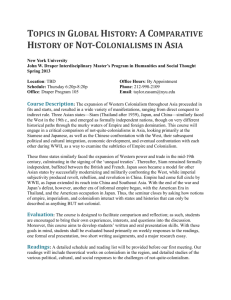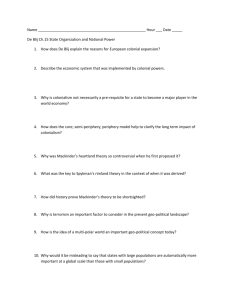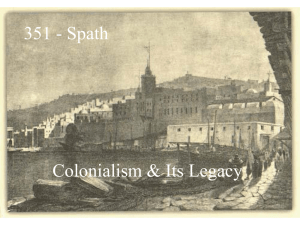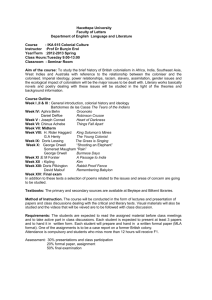colonialism and the history of the british empire: course description
advertisement
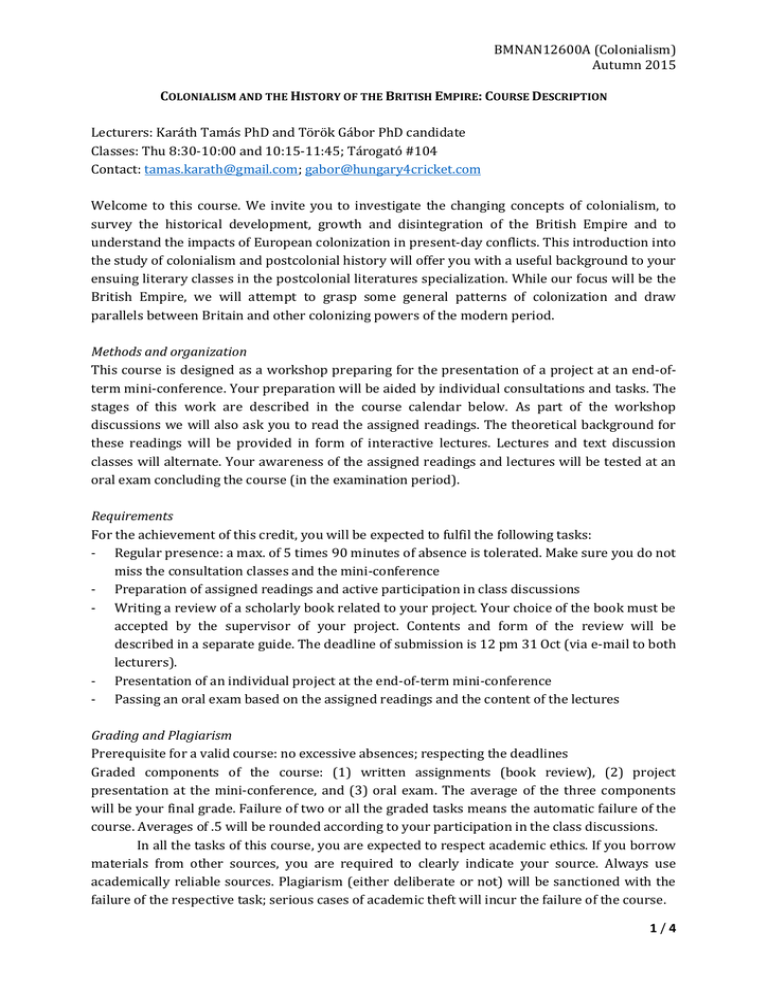
BMNAN12600A (Colonialism) Autumn 2015 COLONIALISM AND THE HISTORY OF THE BRITISH EMPIRE: COURSE DESCRIPTION Lecturers: Karáth Tamás PhD and Török Gábor PhD candidate Classes: Thu 8:30-10:00 and 10:15-11:45; Tárogató #104 Contact: tamas.karath@gmail.com; gabor@hungary4cricket.com Welcome to this course. We invite you to investigate the changing concepts of colonialism, to survey the historical development, growth and disintegration of the British Empire and to understand the impacts of European colonization in present-day conflicts. This introduction into the study of colonialism and postcolonial history will offer you with a useful background to your ensuing literary classes in the postcolonial literatures specialization. While our focus will be the British Empire, we will attempt to grasp some general patterns of colonization and draw parallels between Britain and other colonizing powers of the modern period. Methods and organization This course is designed as a workshop preparing for the presentation of a project at an end-ofterm mini-conference. Your preparation will be aided by individual consultations and tasks. The stages of this work are described in the course calendar below. As part of the workshop discussions we will also ask you to read the assigned readings. The theoretical background for these readings will be provided in form of interactive lectures. Lectures and text discussion classes will alternate. Your awareness of the assigned readings and lectures will be tested at an oral exam concluding the course (in the examination period). Requirements For the achievement of this credit, you will be expected to fulfil the following tasks: - Regular presence: a max. of 5 times 90 minutes of absence is tolerated. Make sure you do not miss the consultation classes and the mini-conference - Preparation of assigned readings and active participation in class discussions - Writing a review of a scholarly book related to your project. Your choice of the book must be accepted by the supervisor of your project. Contents and form of the review will be described in a separate guide. The deadline of submission is 12 pm 31 Oct (via e-mail to both lecturers). - Presentation of an individual project at the end-of-term mini-conference - Passing an oral exam based on the assigned readings and the content of the lectures Grading and Plagiarism Prerequisite for a valid course: no excessive absences; respecting the deadlines Graded components of the course: (1) written assignments (book review), (2) project presentation at the mini-conference, and (3) oral exam. The average of the three components will be your final grade. Failure of two or all the graded tasks means the automatic failure of the course. Averages of .5 will be rounded according to your participation in the class discussions. In all the tasks of this course, you are expected to respect academic ethics. If you borrow materials from other sources, you are required to clearly indicate your source. Always use academically reliable sources. Plagiarism (either deliberate or not) will be sanctioned with the failure of the respective task; serious cases of academic theft will incur the failure of the course. 1/4 BMNAN12600A (Colonialism) Autumn 2015 Course calendar 10 Sep 8:30-10:00 10:15-11:45 17 Sep 8:30-10:00 24 Sep 8:30-10:00 10:15-11:45 1 Oct 8:30-10:00 10:15-11:45 8 Oct 8:30-10:00 10:15-11:45 15 Oct 8:30-10:00 10:15-11:45 Contents / Activity / Readings Tasks and deadlines Presentation of the course: Procedure and tasks Discussion: What was before postcolonialism? (with follow-up readings) Consultation 1: Narrowing down the project Choosing a project topic topic for the conference presentation Lecture (TG): The Roots and Patterns of (Cf. reading) European and British Colonialism Discussion: Colonial legacy Reading: Martin J. Wiener, “The Idea of ‘Colonial Legacy’ and the Historiography of Empire,” The Journal of the Historical Society 13 (2013): 1-32 Lecture (KT): Medieval Colonialism on the British Isles Discussion: Medieval Anglo-Irish encounters (Cf. reading) Readings: (1) The Statutes of Kilkenny, 1367, http://www.mc.maricopa.edu/~thoqh49081 /celtic/KilkennyStatutes.html (2) R.R. Davies, “Patterns of Domination,” in Domination and Conquest: The Experience of Ireland, Scotland and Wales 1100-1300, 1-24 (CUP, 1990); (3) John Gillingham, “The English Invasion of Ireland,” in Representing Ireland: Literature and the origins of conflict, 1534-1660, ed. Brendan Bradshaw, Andrew Hatfield and Willy Maley, 24-42 (CUP, 1993) Consultation 2: Plan/outline of project, Choosing the book for methods, bibliography the book review Lecture (KT): The Beginnings of an English Empire: Early Modern English Colonisations Lecture (TG): Canada: From Cartier to Westminster (1931) Discussion: Puritans in North America (Cf. reading) Reading: Excerpts from Puritan writings (John Smith, John Winthrop, John Cotton, William Bradford and Cotton Mather) – provided on copies 2/4 BMNAN12600A (Colonialism) Autumn 2015 22 Oct 8:30-10:00 10:15-11:45 29 Oct 5 Nov 8:30-10:00 10:15-11:45 12 Nov 8:30-10:00 10:15-11:45 19 Nov 8:30-10:00 26 Nov 10:15-11:45 8:30-10:00 10:15-11:45 3 Dec 10 Dec 8:30-10:00 10:15-11:45 9:00-11:45 Discussion: The formation of the first (Cf. reading) dominion Readings: Perspectives on the War of 1812 at http://www.pbs.org/wned/war-of1812/essays/ (The British and the Canadian perspectives); speech of George-Etienne Cartier on Canadian Confederation (1865) Lecture: The American Frontier from the Colonial Perspective (KT) Book review Autumn break (submission via e-mail until 31 Oct) Lecture (TG): Australia and New Zealand until the fall of Singapore (1942). Consultation 3: Assessment of the book reviews Discussion: Australia and New Zealand (Cf. reading) Reading: Excerpts from Captain Cook's journal and Arthur Phillip’s letter Lecture (KT): History of the British Empire (1783-1918) Discussion: Colonial (Pre-independence) (Cf. reading) India Readings: Tapan Raychaudhuri, “British Rule in India: An assessment,” in The Cambridge Illustrated History of the British Empire, ed. P. J. Marshall, 357-69, (CUP, 1996) Mahatma Gandhi’s statement in the great trial of 1922 Lecture (TG): Decolonization Lecture (KT): The Impacts of Decolonization on British Society and Politics Discussion: Postcolonial crisis in Britain (Cf. reading) Reading: Enoch Powell’s “Rivers of Blood” speech, Margaret Thatcher’s Cheltenham speech (3 July 1982), and Salman Rushdie’s “The Empire within Britain” Consultation 4: Discussion of conference ppt First draft of ppt Concluding remarks and discussion Mini-conference Presentation of individual projects 3/4 BMNAN12600A (Colonialism) Autumn 2015 Project information Project topics Topics supervised by Karáth Tamás: 1) North American puritanism and the idea of civilising mission 2) The ideology of white supremacy and its institutions in British Africa 3) Racial, religious and cultural diversity in colonial Caribbeans or East Africa 4) Decolonization and British identity Topics supervised by Török Gábor (Australia / Canada / India / New Zealand): 1) Colonization and the Australian Aborigines and the New Zealand Maoris 2) From French Canada to British Canada 3) The social and economic impact of British colonization in India 4) The ANZAC theme and the birth of modern nations (Australia and New Zealand) Assessment of the project presentations Aspects of assessment I. PROJECT 1.1 Presenting research question and outlining the problem, thesis and argument 1.2 Structure 1.3 Methods and use of scholarly literature 1.4 Relevance 1.5 Conclusions II. ORAL DELIVERY 2.1 Fluency, pace, pauses, emphases 2.2 Grammar and appropriacy 2.3 Audience involvement (contact) III. PPT DESIGN 3.1 Esthetic 3.2 Visibility of text 3.3 Balance of text and images 3.4 ppt text (spelling, grammar, style) IV. PPT STRUCTURE AND USE OF SOURCES 4.1 Cover and contents pages 4.2 List of sources 4.3 Overall organization 4.4 Correct use of sources (indication of the source of quotes, correct quotation marks) V. RESPONDING TO QUESTIONS TOTAL Maximum point 25 10 5 4 3 3 10 4 4 2 5 1 1 1 2 5 2 1 1 1 5 50 4/4
